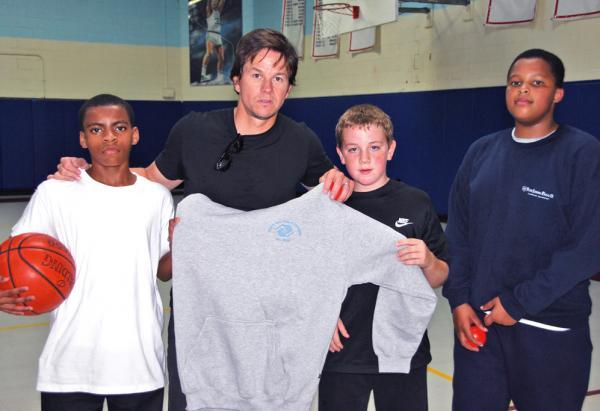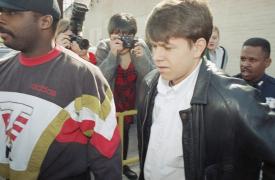December 10, 2014

Mark Wahlberg is shown during a 2010 visit to the Marr Clubhouse of the Boys and Girls Clubs of Dorchester. Wahlberg has been active as a donor and board member at the club since 2000. Photo courtesy BGCD
Mark Wahlberg’s petition seeking a pardon for his 1988 conviction for a violent robbery and assault on Dorchester Avenue has triggered a sharp backlash since it was first reported by New England Cable News last Thursday.
The 43-year-old actor and producer, who has become one of Hollywood’s most sought-after talents since his rise to fame in the early 1990s, has been castigated in the press and online for, among other things, invoking “white privilege” and using his celebrity status to seek special treatment.
The legal petition— which faces an uphill climb to begin with in a state where gubernatorial pardons are rare – has also brought Wahlberg’s long-ago neighborhood misdeeds into stark relief, exposing troubling details about racially charged attacks on neighbors, including black schoolchildren and Vietnamese immigrants in the 1980s.
But opinion has been far more measured –and, in some cases, decidedly supportive –among many of his former Dorchester neighbors, including some who had negative encounters with the teenage Wahlberg before he became famous.
At the Boys and Girls Clubs of Dorchester, longtime executive director Bob Scannell once had to ban the juvenile Wahlberg from the facility because he was a trouble-maker well on his way to becoming a violent criminal. Today, Scannell is one of two men who wrote supportive letters as part of Wahlberg’s official pardon application to the state’s Parole Board last month. (The other official endorsement was written by Fr. Jim Flavin, a Catholic priest who has been a longtime mentor to Wahlberg.)
Scannell serves as a board member of the Mark Walhberg Youth Foundation, a charitable organization that Scannell helped Wahlberg set up in 2001. Since that time, the foundation has dispersed over $7 million in grants, mainly to youth-oriented programs in city neighborhoods. The Boys and Girls Clubs of Dorchester have been the largest single recipient. The Dorchester Ave.-based center received $1.5 million from Wahlberg between 2001-2012, according to Scannell, who adds that the actor is a frequent visitor to the club’s campus.
“Mark could have avoided all this negative attention,” said Scannell. “He doesn’t need a pardon to be successful in his business. He is very contrite and remorseful for what he did and he thinks he can be a good example for kids and for adults, too. I think that it’s pretty genuine. I know it’s very personal to him. It’s important because he wants people to know he’s not the same person he was in 1988. He has never hid from the crap he did as a kid. He talks to kids all the time and he says, ‘I made a lot of mistakes,’ but he’s proud of the example he can be.”
Wahlberg’s representatives did not respond to requests for an interview with the Reporter this week. In a letter attached to his Nov. 26 application to the Parole Board, Wahlberg explained that he hopes a pardon will “be formal recognition that someone like me can receive official public redemption if he devotes himself to personal improvement and a life of good works.”
The specific crime that Wahlberg seeks relief for happened on April 8, 1988 – about two years before he launched his entertainment career as the rapper Marky Mark. Wahlberg was 16 years old when he beat and robbed a Vietnamese man outside a Dot Ave. liquor market. As he fled from the scene, Wahlberg assaulted a second man, also a Vietnamese immigrant, on Pearl Street, leaving him with a permanent eye injury. Arresting officers and the victims testified that Wahlberg made racial statements towards his Vietnamese victims.
 Mark Wahlberg in '93: The performer left Dorchester District Court in April 1993 after criminal charges were dropped against him in an incident in which he allegedly assaulted a Dorchester man in Savin Hill. AP Photo/Paula ScullyHe was convicted in August 1988 and served 45 days of a two-year term in the Plymouth House of Correction.
Mark Wahlberg in '93: The performer left Dorchester District Court in April 1993 after criminal charges were dropped against him in an incident in which he allegedly assaulted a Dorchester man in Savin Hill. AP Photo/Paula ScullyHe was convicted in August 1988 and served 45 days of a two-year term in the Plymouth House of Correction.
Wahlberg was tried as an adult in the assault case, in part, because it was not his first run-in with the law. As a 15 year old, he was found guilty in a civil rights lawsuit brought against him and two other white teens by the state’s attorney general. The three boys assaulted a group of younger black schoolchildren from the Mather School and a teacher on two occasions as they walked through Savin Hill on field trips to the beach. Two students were injured in the confrontations, which included racial epithets – such as “Kill the [n-word]" –being hurled —along with the rocks — at the younger kids. At the time, Wahlberg lived on Peverell Street on Jones Hill with his mother, Alma Wahlberg, and his siblings. The court’s Sept. 1986 judgment ordered him to not assault, threaten, or intimidate anyone based on their race again— and warned him that he’d face a criminal complaint if he did.
Jamarhl Crawford, who edits the Blackstonian website, posted links to court documents from the 1986 civil rights case last week. Crawford emphatically opposes a pardon, saying, “Wahlberg has never publicly acknowledged the particular racist element of his crimes and while he may be philanthropic, the majority of his efforts are certainly not focused on the groups whom he attacked, or, to my knowledge, racial equality and justice in general.”
Dorchester resident Sarah Francis also opposes the idea of a pardon. She started a moveon.com petition asking Gov. Deval Patrick to reject the petition “due to the violent and racially inflammatory aspects of the incident.” The petition had collected 1,865 signatures as of Tuesday night.
In an open letter to Wahlberg, Francis writes: “Your work on the behalf of Dorchester children is commendable and I personally thank you for reaching out to your community. I must ask you, though: How many of those children who have run into trouble before or after experiencing your summer camp experiences will be able to expunge their records?”
But there are others who remain disgusted by Wahlberg’s past crimes yet are willing to hear him out.
In a Page One column he wrote for the Reporter in this edition, Nam Pham, the executive director of the Fields Corner-based organization VietAID, dives into the pain that the neighborhood’s Vietnamese community still feels from awful incidents in the 1980s like the ones Wahlberg perpetrated. Still, Pham concludes: “If Mr. Wahlberg sincerely believes that a pardon would help him to be a better person and be a better father to his children, personally, I would support his request.”
Billy Stewart, assistant chief probation officer at Dorchester District Court, counts himself among those who believe that Wahlberg has already more than made amends — and deserves the pardon if he wants it. Stewart has worked as a probation officer in Dorchester for 37 years— and while he didn’t supervise Mark Wahlberg directly, he knew him and his older brothers as “clowns” and “pain-in-the-ass" teenagers.
“I knew Mark, he was supervised by my partner. I knew the family from being around,” said Stewart. “There were pockets of these kids up and down Dorchester Avenue in the 1980s – at Wainwright Park, Hecla Street, Fields Corner. White kids who were being moved out reacted to losing their turf. These kids got caught in the flux and they reacted violently out in the street. And they were a tough group to work with. If you asked me at the time and remembering him – he was a tough kid and wouldn’t listen to much.”
Still, Stewart said that Mark Wahlberg was changed by his experience behind bars.
“If there’s a classic case of the corrections system working the way it’s intended to work, this is it. He was corrected,” said Stewart. “By going to the House of Correction for what he did and doing his time and probation, he has paid his debt to society. It was over, that chapter is closed. “
“I think he’s the poster child for a pardon, not because of the celebrity — that means nothing that he’s a Hollywood star. Did he earn his good name back? Yes, but it’s because of what he’s done with kids.”
Last summer, while in town to film “Ted 2,” Wahlberg visited the BGCD’s Marr clubhouse on Deer Street to shoot hoops with some of the kids on his down time. Bob Scannell remembers that Mark caused a sensation with some of the teens because of what were on his feet.
“Mark was wearing these new sneakers and the kids were like, “Whoa, where did you get those? They’re not even out yet!’ Mark said, “Well, you know, I know this guy.’”
According to Scannell, Wahlberg picked up his phone and called the sneaker guy right there on the spot. He put him on the phone with a few of the teens. It was Michael Jordan.
“I’ll bring him by next time he’s in Boston,” Wahlberg told the slack-jawed kids.
“It’s Dorchester he cares most about,” said Scannell, who ticked off some of the organizations who’ve also received grants, some in the tens of thousands of dollars, from Wahlberg’s foundation: Boston’s Ten Point Coalition, All Dorchester Sports League, the Chittick School in Hyde Park, Project DEEP, Dorchester Pop Warner, Boston City Singers, Neighborhood House Charter School and the Louis D. Brown Peace Institute.
Wahlberg has also donated substantial funds to city neighborhood-oriented projects and scholarships in Los Angeles. And he has directed tens of thousands of dollars in grants to prison-based programs, including the Torah Center in New York City and Boston’s Span Inc., which helps prisoners preparing for re-entry.
“Mark leverages money and his connections for us at the club,” explains Scannell. “He paid for the film studio on our fourth floor here. He paid for the studio itself, but he also used his connections with the Taco Bell Foundation to provide operating money. And they did that because Mark did a PSA for them. That never would have happened for us.”
Scannell says he is frustrated that more people don’t understand the degree to which Wahlberg has given back in his time and treasure, adding that it’s partly Mark’s fault.
“He does everything quietly and that’s against my advice because I tell him that the publicity helps us raise other funds. But he says, ‘Let’s just do it. I don’t want the pictures with the checks.’ But who else can say they’ve given millions to Dorchester. And hundreds of thousands more in scholarships that nobody knows about?”
Billy Stewart says that Wahlberg’s consistent association with the Boys and Girls Clubs alone is enough to convince him of Wahlberg’s sincerity. “Here’s a kid who didn’t forget where he’s from and he’s helping these kids at the Boys and Girls Club. It’s always a special place – it’s a multinational place. … I don’t see kids from that club coming into this building [Dorchester District Court]. They have an alternative to what they’re living with at home,” said Stewart. “Mark has a lot to do with opening those doors for them.”
Topics:


